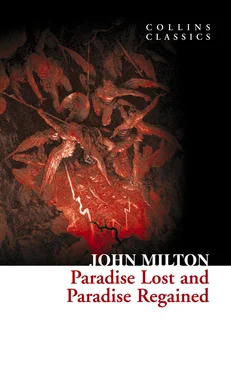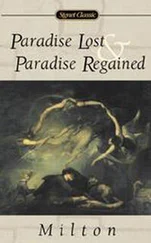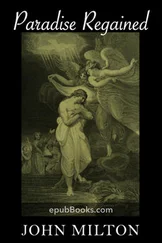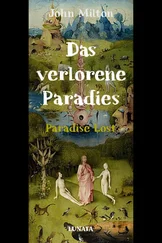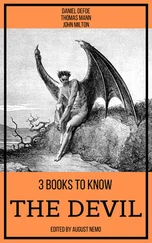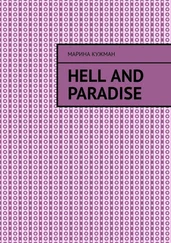1 ...6 7 8 10 11 12 ...21 That for the general safety he despised
His own: for neither do the Spirits damned
Lose all their virtue; lest bad men should boast
Their specious deeds on earth, which glory excites,
Or close ambition varnished o’er with zeal.
Thus they their doubtful consultations dark
Ended, rejoicing in their matchless Chief:
As, when from mountain-tops the dusky clouds
Ascending, while the north wind sleeps, o’erspread
Heaven’s cheerful face, the louring element
Scowls o’er the darkened landscape snow or shower,
If chance the radiant sun, with farewell sweet,
Extend his evening beam, the fields revive,
The birds their notes renew, and bleating herds
Attest their joy, that hill and valley rings.
O shame to men! Devil with devil damned
Firm concord holds; men only disagree
Of creatures rational, though under hope
Of heavenly grace, and, God proclaiming peace,
Yet live in hatred, enmity, and strife
Among themselves, and levy cruel wars
Wasting the earth, each other to destroy:
As if (which might induce us to accord)
Man had not hellish foes enow besides,
That day and night for his destruction wait!
The Stygian council thus dissolved; and forth
In order came the grand infernal Peers:
Midst came their mighty Paramount, and seemed
Alone th’ antagonist of Heaven, nor less
Than Hell’s dread Emperor, with pomp supreme,
And god-like imitated state: him round
A globe of fiery Seraphim enclosed
With bright emblazonry, and horrent arms.
Then of their session ended they bid cry
With trumpet’s regal sound the great result:
Toward the four winds four speedy Cherubim
Put to their mouths the sounding alchemy,
By herald’s voice explained; the hollow Abyss
Heard far and wide, and all the host of Hell
With deafening shout returned them loud acclaim.
Thence more at ease their minds, and somewhat raised
By false presumptuous hope, the ranged Powers
Disband; and, wandering, each his several way
Pursues, as inclination or sad choice
Leads him perplexed, where he may likeliest find
Truce to his restless thoughts, and entertain
The irksome hours, till his great Chief return.
Part on the plain, or in the air sublime,
Upon the wing or in swift race contend,
As at th’ Olympian games or Pythian fields;
Part curb their fiery steeds, or shun the goal
With rapid wheels, or fronted brigades form:
As when, to warn proud cities, war appears
Waged in the troubled sky, and armies rush
To battle in the clouds; before each van
Prick forth the airy knights, and couch their spears,
Till thickest legions close; with feats of arms
From either end of heaven the welkin burns.
Others, with vast Typhoean rage, more fell,
Rend up both rocks and hills, and ride the air
In whirlwind; Hell scarce holds the wild uproar:—
As when Alcides, from Oechalia crowned
With conquest, felt th’ envenomed robe, and tore
Through pain up by the roots Thessalian pines,
And Lichas from the top of Oeta threw
Into th’ Euboic sea. Others, more mild,
Retreated in a silent valley, sing
With notes angelical to many a harp
Their own heroic deeds, and hapless fall
By doom of battle, and complain that Fate
Free Virtue should enthrall to Force or Chance.
Their song was partial; but the harmony
(What could it less when Spirits immortal sing?)
Suspended Hell, and took with ravishment
The thronging audience. In discourse more sweet
(For Eloquence the Soul, Song charms the Sense)
Others apart sat on a hill retired,
In thoughts more elevate, and reasoned high
Of Providence, Foreknowledge, Will, and Fate—
Fixed fate, free will, foreknowledge absolute,
And found no end, in wandering mazes lost.
Of good and evil much they argued then,
Of happiness and final misery,
Passion and apathy, and glory and shame:
Vain wisdom all, and false philosophy!—
Yet, with a pleasing sorcery, could charm
Pain for a while or anguish, and excite
Fallacious hope, or arm th’ obdured breast
With stubborn patience as with triple steel.
Another part, in squadrons and gross bands,
On bold adventure to discover wide
That dismal world, if any clime perhaps
Might yield them easier habitation, bend
Four ways their flying march, along the banks
Of four infernal rivers, that disgorge
Into the burning lake their baleful streams—
Abhorred Styx, the flood of deadly hate;
Sad Acheron of sorrow, black and deep;
Cocytus, named of lamentation loud
Heard on the rueful stream; fierce Phlegethon,
Whose waves of torrent fire inflame with rage.
Far off from these, a slow and silent stream,
Lethe, the river of oblivion, rolls
Her watery labyrinth, whereof who drinks
Forthwith his former state and being forgets—
Forgets both joy and grief, pleasure and pain.
Beyond this flood a frozen continent
Lies dark and wild, beat with perpetual storms
Of whirlwind and dire hail, which on firm land
Thaws not, but gathers heap, and ruin seems
Of ancient pile; all else deep snow and ice,
A gulf profound as that Serbonian bog
Betwixt Damiata and Mount Casius old,
Where armies whole have sunk: the parching air
Burns frore, and cold performs th’ effect of fire.
Thither, by harpy-footed Furies haled,
At certain revolutions all the damned
Are brought; and feel by turns the bitter change
Of fierce extremes, extremes by change more fierce,
From beds of raging fire to starve in ice
Their soft ethereal warmth, and there to pine
Immovable, infixed, and frozen round
Periods of time,—thence hurried back to fire.
They ferry over this Lethean sound
Both to and fro, their sorrow to augment,
And wish and struggle, as they pass, to reach
The tempting stream, with one small drop to lose
In sweet forgetfulness all pain and woe,
All in one moment, and so near the brink;
But Fate withstands, and, to oppose th’ attempt,
Medusa with Gorgonian terror guards
The ford, and of itself the water flies
All taste of living wight, as once it fled
The lip of Tantalus. Thus roving on
In confused march forlorn, th’ adventurous bands,
With shuddering horror pale, and eyes aghast,
Viewed first their lamentable lot, and found
No rest. Through many a dark and dreary vale
They passed, and many a region dolorous,
O’er many a frozen, many a fiery alp,
Rocks, caves, lakes, fens, bogs, dens, and shades of death—
A universe of death, which God by curse
Created evil, for evil only good;
Where all life dies, death lives, and Nature breeds,
Perverse, all monstrous, all prodigious things,
Abominable, inutterable, and worse
Than fables yet have feigned or fear conceived,
Gorgons, and Hydras, and Chimeras dire.
Meanwhile the Adversary of God and Man,
Satan, with thoughts inflamed of highest design,
Puts on swift wings, and toward the gates of Hell
Explores his solitary flight: sometimes
He scours the right hand coast, sometimes the left;
Now shaves with level wing the deep, then soars
Up to the fiery concave towering high.
As when far off at sea a fleet descried
Hangs in the clouds, by equinoctial winds
Close sailing from Bengala, or the isles
Of Ternate and Tidore, whence merchants bring
Their spicy drugs; they on the trading flood,
Through the wide Ethiopian to the Cape,
Читать дальше
